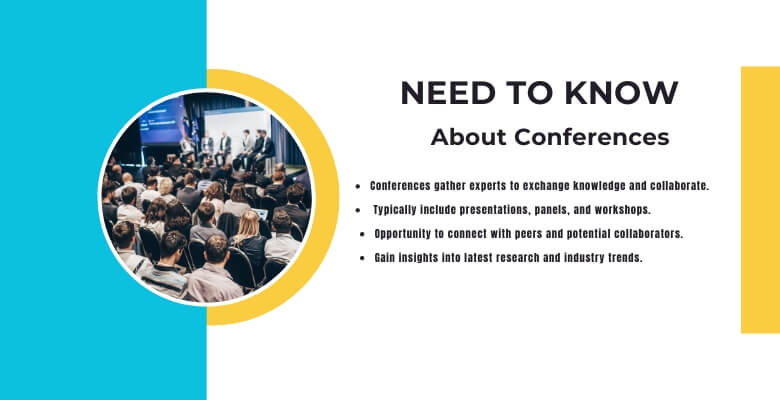Attending a conference is an excellent opportunity to gain new knowledge, network with industry professionals, and stay updated with the latest trends. However, to make the most out of it, you need to be strategic and prepared. So, what is important when attending a conference?
When attending a conference, it’s essential to network, engage actively in sessions, and take detailed notes. Prioritize key presentations, participate in discussions, and follow up with new contacts to maximize the benefits and gain valuable insights.
Curious to learn more tips and strategies for making your conference attendance truly impactful? Follow along with the rest of the article to discover essential advice that will help you succeed.
What Do You Need to Know About Conferences?
Conferences serve as a hub for professionals to share knowledge, ideas, and innovations. Attending these gatherings allows individuals to network with peers and industry leaders. The exposure can significantly improve your understanding and open up new career opportunities.

Such events often feature workshops, keynotes, and panels that cover the latest industry trends. Many attendees believe that the importance of attending conference lies in the real-time exchange of ideas and knowledge. This interaction fosters collaboration and can spark new initiatives or partnerships.
It’s a chance to see how others tackle challenges and apply different strategies. Moreover, these events provide a platform for professional development and continuing education. Feedback from past conference participants typically highlights the value of the connections made.
These connections can lead to mentorship opportunities and potential collaborations. Engaging with diverse perspectives enriches one’s professional journey. Conferences often offer a showcase for new technologies and services that can transform your workflow.
What is Important When Attending a Conference?
Attending a conference isn’t just about sitting in a room and listening—it’s about making the most of every opportunity. Whether you’re there to learn, meet people, or explore career paths, being prepared helps. A little planning ensures you leave with valuable insights. Let’s explore what matters most.
Planning Ahead
Good preparation makes a huge difference. Start by checking the event schedule and deciding which sessions interest you the most. Booking accommodations early can save time and hassle. If there are networking events, consider attending to meet people before the main sessions begin. Having a clear plan helps you stay focused and stress-free during the conference.
Engaging with Speakers
Speakers offer insights that can shape your perspective. Instead of just listening, take the chance to ask questions or participate in discussions. Showing genuine interest can help you stand out. If a speaker’s topic really resonates with you, connect with them afterward. Even a short conversation can lead to useful advice or future opportunities.
Making Meaningful Connections
Networking is more than handing out contact details. Instead of trying to meet everyone, focus on quality connections. Approach people with shared interests and start genuine conversations. A strong professional relationship often begins with a simple discussion. Following up after the event ensures your connections don’t fade away. Small efforts can lead to great opportunities.
Managing Your Time
Balancing learning and networking can be tricky. Prioritize key sessions while leaving time for breaks and informal interactions. Trying to do everything may lead to burnout, so be selective. A flexible schedule keeps you organized while allowing for last-minute changes. A well-balanced approach ensures you enjoy the conference while making the most of every opportunity.
Taking Useful Notes
Simply listening isn’t enough—you need to capture important points. Whether you prefer a notebook or a digital tool, organize your notes clearly. Highlight key takeaways, action points, and ideas worth revisiting later. Well-structured notes make it easier to recall valuable insights. Reviewing them after the event helps reinforce what you’ve learned and apply it effectively.
Handling Unexpected Situations
Even the best plans don’t always go smoothly. Sessions might change, or technical issues could arise. Instead of stressing, stay flexible and look for alternatives. Having backup plans for accommodations or transport can also help avoid unnecessary problems. A calm and adaptable approach ensures you get the most out of the event, no matter what happens.
Staying Professional
How you present yourself matters. Dressing appropriately, speaking confidently, and respecting others make a strong impression. Simple gestures like being punctual and listening actively help you stand out. A positive and approachable attitude makes networking easier. Your professional behavior at the event can leave a lasting impact on those you meet.
Exploring Additional Opportunities
Many conferences offer extra perks beyond the main sessions. If you’re attending a conference in Canada with invitation letter, you may have access to exclusive networking events or guided industry tours. Taking part in these activities can provide valuable insights and connections. Exploring everything the conference offers ensures you get the most out of your experience.
Following Up After the Event
Your conference experience doesn’t end when you leave. A quick message or email to new contacts can strengthen your connections. Reviewing your notes helps turn ideas into actions. Implementing what you’ve learned ensures long-term benefits. The effort you put in after the event often determines how valuable your experience truly becomes.
A well-planned approach helps you gain more from any conference. From meaningful conversations to learning new skills, every aspect matters. Stay engaged, take advantage of opportunities, and make your conference experience truly worthwhile.
What Should You Bring to a Conference?
Preparing for a conference isn’t just about marking your calendar. To fully benefit from the experience, packing the right items is crucial. Here’s what you should bring to ensure a productive and engaging time at any professional conference:
- Business Cards: These are essential for networking, allowing you to exchange contact information quickly. Keep them accessible in your bag or a cardholder.
- Notebook and Pens: Capture important insights and ideas during sessions. A physical notebook avoids the distractions that digital devices can bring.
- Chargers and Power Banks: Ensure your phone and other devices stay charged throughout the day. You wouldn’t want to miss capturing a crucial moment due to a dead battery.
- Water Bottle: Staying hydrated is key, especially in back-to-back sessions. A refillable water bottle is environmentally friendly and convenient.
- Professional Attire: Dressing appropriately can make a good impression and boost your confidence. Consider the conference setting and norms when choosing your outfits.
- Snacks: Healthy snacks can keep your energy up during long sessions. Items like nuts or granola bars are portable and mess-free.
- Schedule and Documents: Print out the schedule or have it available on your device. This keeps you on track with the sessions and activities you’ve planned to attend.
- The Right Attitude: Bring an open mind and a positive outlook. Engaging with new people and ideas can open up numerous opportunities.
Being aware of the importance of attending professional conferences can help you fully appreciate the value these events bring to your career growth. By coming prepared, you maximize the insights and connections these gatherings offer.
What Are the Benefits of Attending a Conference?
Your professional and personal growth can be significantly improved by attending a conference. These events provide a unique opportunity to learn, network, and gain new insights. Here’s explore the key benefits of participating in conferences.
Networking Opportunities
Conferences bring together professionals from various fields, providing an excellent networking platform. You can meet potential collaborators, mentors, and industry leaders. Engaging with peers can lead to valuable professional relationships. Networking can also open doors to new career opportunities.
Learning from Experts
Conferences often feature presentations and workshops led by industry experts. These sessions offer insights into the latest trends and best practices. Learning from experts can improve your knowledge and skills. The impact of conferences for residency programs, for example, is often seen in the valuable connections and skills gained, which can enhance professional development and career prospects. It provides a chance to stay updated with industry developments.
Gaining New Perspectives
Interacting with diverse attendees can broaden your perspective. Different viewpoints can spark innovative ideas and solutions. Listening to various experiences helps in understanding different approaches. This exposure can be valuable for personal and professional growth.
Improving Your Knowledge
Conferences cover a wide range of topics relevant to your field. Attending these sessions can deepen your understanding of specific areas. You can learn about new tools, techniques, and strategies. Improved knowledge can improve your performance and expertise.
Boosting Your Career
Presenting at conferences can increase your professional profile. It showcases your expertise and can lead to recognition in your field. Even attending can boost your resume by showing your commitment to professional development. This involvement can be a significant career boost.
Building Confidence
Participating in conferences can help build your confidence. Engaging in discussions and networking improves your communication skills. Presenting your work can improve your public speaking abilities. Increased confidence can positively impact your career and personal life.
Tips to Utilize Conference Participation to Your Personal Growth?
Conferences offer powerful opportunities for personal growth and professional development. With thoughtful preparation and proactive engagement, attendees can maximize the value they gain from each event. Here’s a guide to making the most of your next conference experience and setting yourself up for success.
- Begin by researching the speakers and sessions that match your goals. Prioritizing those that align with your interests helps keep you focused and motivated.
- Expand your network by connecting with new people instead of sticking with familiar faces. Building diverse relationships can open doors and strengthen your professional community.
- When opportunities for questions arise, seize them. Speaking up shows your engagement and may lead to meaningful conversations later.
- Jotting down key points helps to internalize important ideas. These notes become valuable references when revisiting insights in the future.
- Share what you’ve learned with others through blogging or social media. Publicly reflecting on insights reinforces retention and learning.
- Conferences are also ideal places to seek out potential mentors. Many experts are open to guiding others, so don’t hesitate to ask for advice.
- After the event, set aside time to process what you’ve learned and consider how to apply it in life. This post-conference reflection enriches your experience and allows you to make the most of the conference experience.
With these strategies, you’ll find that conferences become much more than a professional obligation. Instead, they turn into transformative experiences, sparking fresh perspectives and growth that stay with you long after the event.
FAQs About What is Important When Attending a Conference?
Having a good knowledge of what to expect and being well-prepared can make attending a conference a worthwhile experience. Here are some frequently asked questions to help you make the most of your conference attendance.
How Can I Network Effectively at a Conference?
Engage with attendees during breaks and social events. Have your business cards ready and follow up with new contacts after the conference. Joining discussions and asking questions can also help you stand out.
How Can I Make the Most of the Sessions?
Prioritize sessions that align with your professional interests and goals. Take detailed notes and ask questions to clarify any doubts. Actively participate in discussions to deepen your understanding of the topics.
How Should I Follow Up with Contacts After a Conference?
Send personalized emails or connect on professional networks like LinkedIn. Discuss potential collaborations or share resources of mutual interest. Consistent follow-up helps build lasting professional relationships.
How Can I Engage Actively in Conference Sessions?
Ask questions and contribute to discussions to improve your learning experience. Engaging with speakers can open doors for further conversations. Participation makes you more memorable to other attendees and presenters.
How Can Attending a Conference Boost My Career?
Presenting at conferences can improve your professional profile and lead to recognition in your field. Even attending shows your commitment to professional development, which can be beneficial for your resume and career growth.
Last Word
Conferences are incredible opportunities for both personal and professional growth. They offer a rich environment for networking, learning from industry leaders, and discovering the latest trends. You can significantly improve your conference experience by preparing thoroughly and engaging actively.
Essentially, what is important when attending a conference? Strategic planning and active participation. From creating a well-thought-out schedule to prioritizing key presentations, each step ensures you maximize your time. Make sure you network effectively and follow up with new contacts to solidify those valuable connections.
Attending a conference can boost your career, expand your knowledge, and boost your confidence. With the right approach, you’ll leave not only with new insights but also with a renewed enthusiasm for your field. So, get ready, stay engaged, and make your next conference a truly impactful experience.







